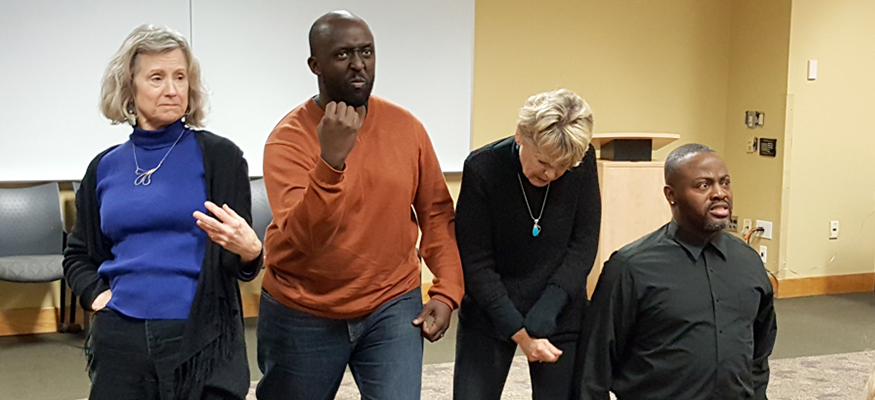Diversity Theater Plays Key Role in RIT HHMI Inclusive Excellence Grant Initiative | February 2018
- RIT /
- Diversity and Inclusion /
- Newsletters /
- February 2018 /
- Diversity Theater Plays Key Role in RIT HHMI Inclusive Excellence Grant Initiative

The arts are a unique and engaging way of communicating stories and key messages. Music, theater, and the visual arts can hone in on emotions—revealing aspects of life that resonate with or enlighten the viewer or listener.
Playback Theatre is an artistic form that is especially effective at guiding the audience to see other points of view and helps enable difficult conversations. The improvisational theatrical form forwards the right for any and all voices to be heard—ultimately stimulating dialogue— and is now performed world-wide, being used in schools, prisons, private sector organizations, hospice centers, disaster recovery, birthday parties, weddings and more.
Within the Division of Diversity and Inclusion at RIT, Tina Chapman DaCosta, Director of Diversity Theater, is using Playback Theatre methods to connect people through the arts. Her work includes the Inclusive Excellence (IE) Initiative in the College of Science. The program, funded by a grant from the Howard Hughes Medical Institute, focuses on three areas or strands: Research Mentoring, Classroom Practice, and Community. DaCosta is working with community strand leader Dr. Jennifer Connelly of the School of Physics and Astronomy, to foster community, emphasizing experiences and understanding of inclusion.
Playback Theatre has already been incorporated into workshops for community liaisons and a Diversity Theater session with faculty, staff and students from the School of Physics and Astronomy (SoPA). Audience member stories were enacted on the spot by Diversity Theater actors, allowing personal struggles or successes surrounding biases and inclusion to be shared.
 “When Jen asked me to provide a Playback Theatre (PBT) community building aspect for the HHMI proposal, I was pleased to have the opportunity to engage the College of Science in the PBT experience,” comments Chapman DaCosta. “The four PBT workshops are designed in a phased-approach for a cohort of 24 students, faculty and staff to experience a common Diversity & Inclusion theme together. The first workshop, Inclusion Starts with I, allowed participants to share personal stories about when they felt included which led to sharing exclusion stories as well. This enabled the participants to know each other better, thus completing the first phase of community building.”
“When Jen asked me to provide a Playback Theatre (PBT) community building aspect for the HHMI proposal, I was pleased to have the opportunity to engage the College of Science in the PBT experience,” comments Chapman DaCosta. “The four PBT workshops are designed in a phased-approach for a cohort of 24 students, faculty and staff to experience a common Diversity & Inclusion theme together. The first workshop, Inclusion Starts with I, allowed participants to share personal stories about when they felt included which led to sharing exclusion stories as well. This enabled the participants to know each other better, thus completing the first phase of community building.”
Three more Diversity Theater sessions with this year’s SoPA participants will take place during the spring semester. The remaining PBT workshop themes are: Unconscious Bias & Diversity Awareness, Active Bystander Awareness and Transformative Experiences. The series will then be repeated with a new group from Physics and adding groups from Biology and Chemistry, extending the community building work and awareness around inclusion in STEM education at RIT each year.
More about Inclusive Excellence
Six months into the five-year grant project, the Inclusive Excellence (IE) team has organized and held more than 30 grant-related events. Forty-one faculty from the Schools of Physics & Astronomy, Biology, and Chemistry & Materials Science participated in at least one program activity.
Email: InclusiveExcellence@rit.edu



